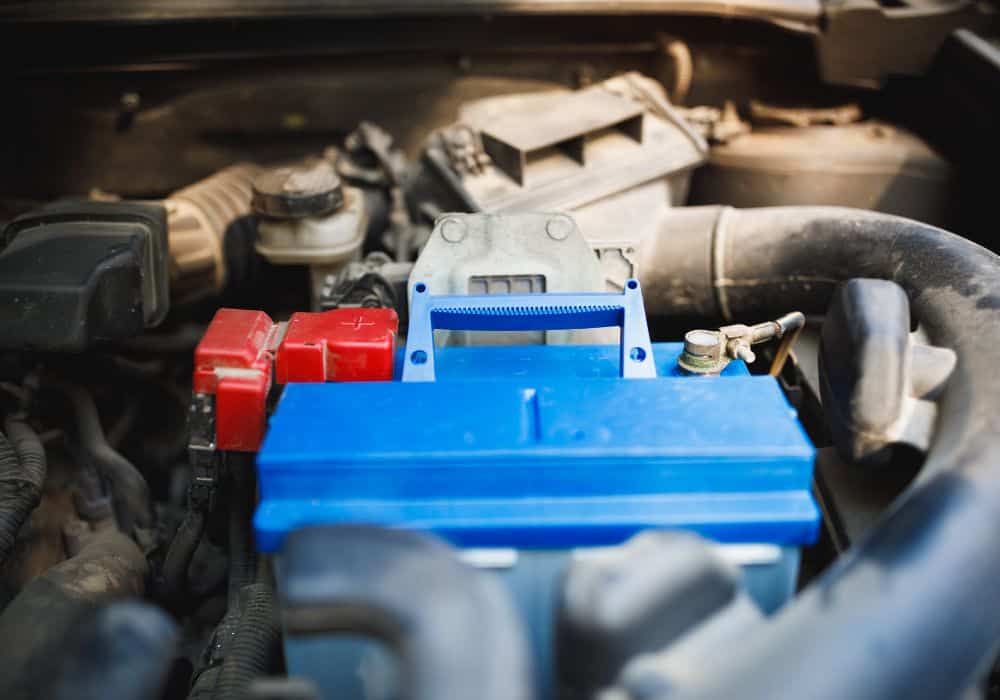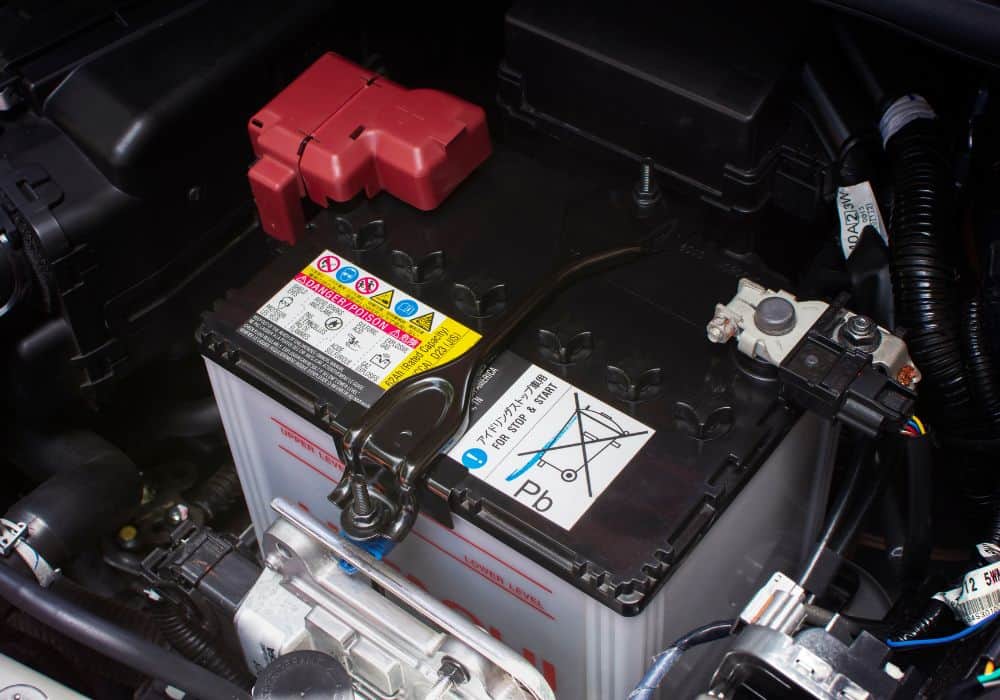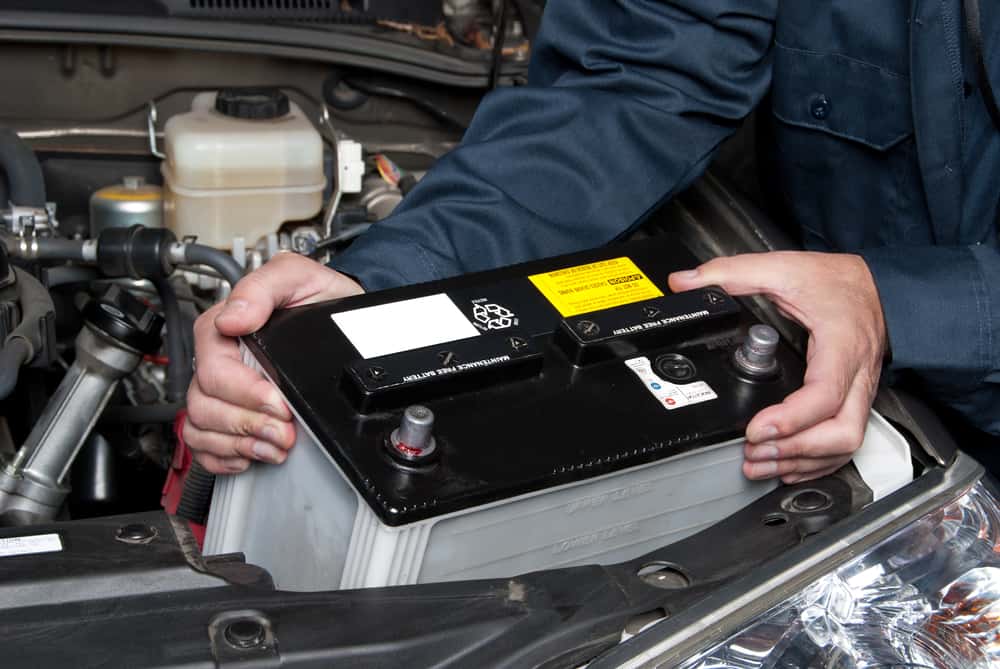Have you ever wondered how much does a car battery weigh? The battery is one of the most important components of your car. It’s responsible for starting your engine and powering all of the electrical systems in your car, so it’s important to have a good battery that is in good condition.
Researching how much a car battery weighs is one of the first things you’ll do if, for example, you have a dead one to change out or similar.
In this article, we’ll answer that question and provide some information on different types of batteries. Read on for more!
Table of Contents
How Will I Know How Much A Car Battery Weighs?
If you’ve never had to look into how much a car battery weighs, you may have no idea how to go about finding the answer. Fortunately, there are a few ways you can determine how much your car battery weighs. Let’s look at a few examples:

Check the Battery’s Label
The first way is to look at the label on the battery. This should be located on the top or side of the battery and will list the weight in either pounds or kilograms, as well as other information like the voltage and the battery’s composition. And if the label is worn down, you can check the agent’s handbook or owner’s manual.
Use the BCI Group Number
If there is no label on the battery or it is worn down, you can also look up the weight by the battery’s BCI group number. This is a code that is used to identify the size and type of battery. You can find this number on the side of the battery, and you can then look up the weight in a chart or online database.
Ask the Manufacturer
Another way to determine the weight of your car battery is to ask the manufacturer. They will be able to tell you the weight of the battery, as well as the dimensions and other important information.
How Much Does a Car Battery Weigh?
Now that you understand how to find the weight of your particular car battery, you may be asking what a car battery weighs. The average car battery weight is between 25 lbs and 50 lbs. However, that number will vary greatly, depending on many factors.
In the end, the weight of a car battery really depends on the type of battery your car has, the amount of voltage it has, its fluid level, and the type of car it’s in.
To give you a better idea, here are a few types of battery weights that your car may have:
Lightweight Batteries
Some car batteries are designed to be lightweight. These types of batteries are often used in small cars and in electric cars. They can weigh as little as 10 or 15 lbs and about as much as 20 lbs. Keep in mind that it’s possible to have too lightweight of a battery for your vehicle to function properly, so be sure to do your research before making a purchase on a lightweight battery.
One type of lightweight battery is the lithium-ion battery, for example. Lithium has a lower weight, yet it can still operate a small vehicle with a sufficient amount of power.
Standard Batteries
This type of battery is usually found in cars, trucks, and SUVs and is the most common battery. The average weight of a standard car battery is between 30 lbs and 60 lbs.
Empty Batteries
If your battery is empty, it will weigh less than if it were full. This is because the electrolyte solution inside the battery is what adds weight. When this solution evaporates, the battery will weigh less.
Types of Car Batteries
Now that you know how much car batteries weigh, let’s take a look at the different types of batteries that might be in your car.

Lead-Acid Battery
The most common type of battery is the lead-acid battery. This car battery is made up of lead and sulfuric acid. They have a generally lower energy density when compared to other car batteries, but they are a tried and true choice for vehicles.
Lead-acid batteries are usually found in older cars, as they were the very first type of rechargeable battery ever created. Typically, they will weigh just a little under 40 lbs (17 kg).
Lithium-Ion Battery
Lithium-ion batteries are newer than lead-acid batteries and they are often found in electric cars and other small vehicles like electric golf carts. The reason for this is because they are rechargeable.
They also tend to offer more reliability and efficiency than the basic lead-acid battery, but they don’t tend to be great for vehicles that aren’t used very often. Usually, these batteries weigh about 26 lbs (12 kg).
AGM Batteries
AGM (absorbed glass mat) batteries are a more advanced type of lead-acid battery that is sealed so that the electrolyte solution cannot leak out. They are a newer type of battery that is becoming more popular.
They are a popular battery because they were designed for multiple purposes. One is that they can offer more start-up power. The other is that they last longer than other types of batteries.
The main downside to this battery is that they tend to be more expensive. AGM batteries are of average weight, coming in at around 39 lbs (17 kg).

Hybrid Batteries
Hybrid batteries are similar to AGM batteries but tend to be heavier. They are often found in hybrid cars and trucks, and the beauty of these batteries is that they allow a hybrid vehicle to switch between gas and the battery for power–simply plug in the car to keep the battery charged. Hybrid batteries can weigh up to 100 pounds.
Deep-Cycle Batteries
Deep-cycle batteries are a type of battery that is designed to be discharged and recharged many times. They are often used in vehicles that require a boost of power and will be running for a long time at a high capacity (80% to 100% depth of discharge). For example, this type of battery is often used in recreational vehicles and marine applications.
There are two types of deep-cycle batteries, including the deep cycle gel and AGM batteries. Both are designed for that quick start and sustained power. Deep-cycle batteries can weigh around 70 lbs (32 kg).
Electric Car Batteries
Batteries for electric cars are the heaviest type of battery, and they can weigh up to 1000 pounds. This may sound high compared to the weight of other batteries, but that is because these batteries are often made up of many smaller batteries that are connected together to create a large battery pack.
How Long Does a Car Battery Last?

So, now that you know the possible weight of your car battery, your next question may be, how long will this car battery last?
The good news is, it was probably last a very long time. That is, unless it is already very old or has not been treated well thus far. The lifespan of a car battery depends on many factors, such as the type of battery, how often it’s used, how it’s maintained, and the climate.
In general, a lead-acid battery will last between 3 and 5 years, while a lithium-ion battery will last between 10 to 20 years. AGM batteries usually last about 6 to 10 years, while hybrid batteries can last from about 5 to 15 years. Deep-cycle batteries have a lifespan of about 3 to 6 years, and electric car batteries have a long lifespan and can last around 15 years.
Of course, these are just estimates and your battery may last longer or shorter depending on how you use and care for it.
If you want your car battery to last as long as possible, there are a few things you can do.
First, make sure to keep it clean–as with many things in life, the dirt and neglect of a battery can shorten its lifespan. Second, keep it charged since an empty battery is more likely to fail. Finally, don’t forget to check the level of the electrolyte solution.
By following these simple tips, you can help ensure that your car battery lasts as long as possible. A cared-for battery is a long-living battery.
In Conclusion
As you can see, there is a lot of variation in how much car batteries weigh. The weight of your battery will depend on the type of battery, the size of the battery, and the manufacturer.
If you’re ever unsure about how much your car battery weighs, be sure to check the label, ask the manufacturer, or look up the weight online. Knowing the weight of your car battery is important for many reasons, so it’s good to be informed.
What type of battery is in your vehicle? Share your discovery with us in the comments below! Thanks for reading!
